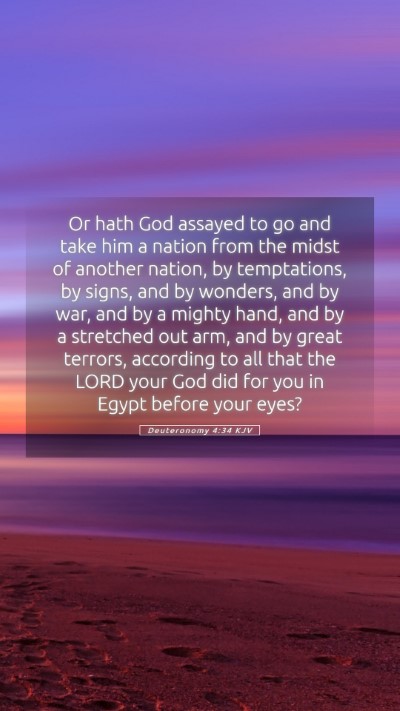Understanding Deuteronomy 4:34
Bible Verse: "Or has God ever tried to go and take for himself a nation from the midst of another nation, by trials, by signs, by wonders, and by war, by a mighty hand and an outstretched arm, and by great terrors, according to all that the Lord your God did for you in Egypt before your eyes?"
This verse presents a profound reflection on God's unique ability to intervene in human history to establish His people. Below is a summarized analysis of its meaning based on insights from public domain commentaries such as those by Matthew Henry, Albert Barnes, and Adam Clarke.
Key Themes and Insights
-
Divine Intervention:
The verse highlights the extraordinary nature of God's sovereign actions. It emphasizes that He has taken a people for Himself through dramatic events that can only be attributed to His power. Matthew Henry notes that such acts of God are not typical; they are miraculous and serve a specific purpose of divine revelation and covenant establishment.
-
God's Doing vs Human Efforts:
Albert Barnes emphasizes that no human leader or nation has the capacity to achieve what God has accomplished for Israel. The divine intervention is marked by trials, signs, and wonders that cannot be replicated by human means. This serves to reaffirm the believers' reliance on God's might rather than their own strength.
-
Historical Context:
Adam Clarke points out the historical significance of the events surrounding the Israelites' exodus from Egypt. The mention of "Egypt” invokes the story of liberation and miracles, reinforcing the idea that God's actions are grounded in historical reality, thus providing a substantial foundation for the faith of Israel.
-
Significance of Liberation:
The emphasis on God taking a nation signifies a divine choice and a covenant relationship. This liberation serves not only as a historical event but also as a theological cornerstone. Matthew Henry comments that understanding the significance of liberation from slavery in Egypt is essential in understanding the nature of God's commitment to His people.
-
Application to Believers Today:
This passage speaks to the modern believer about God's active involvement in their lives. The assurance that God moves in powerful ways to deliver and transform helps believers to recognize His work even today. It encourages faith in His ongoing providence and intervention in personal and community challenges.
Cross References
- Exodus 3:10: "Come, I will send you to Pharaoh that you may bring my people, the children of Israel, out of Egypt."
- Psalms 77:14: "You are the God who works wonders; you have made known your might among the peoples."
- Acts 7:36: "This man led them out, performing wonders and signs in Egypt and at the Red Sea and in the wilderness for forty years."
Conclusion
Deuteronomy 4:34 serves as a powerful reminder of God's sovereignty and the historical acts by which He has established His people. By examining this verse, we gain insight into God's nature and His faithfulness, which continues to resonate in the lives of believers today.
Further Study and Application
For more insight, Bible study groups may explore these themes using various Bible study tools and resources that can enhance their understanding of this and related scripture. Engaging in discussions around the historical context of the Exodus narrative can further enrich one’s grasp of its significance in both past and present faith practices.


